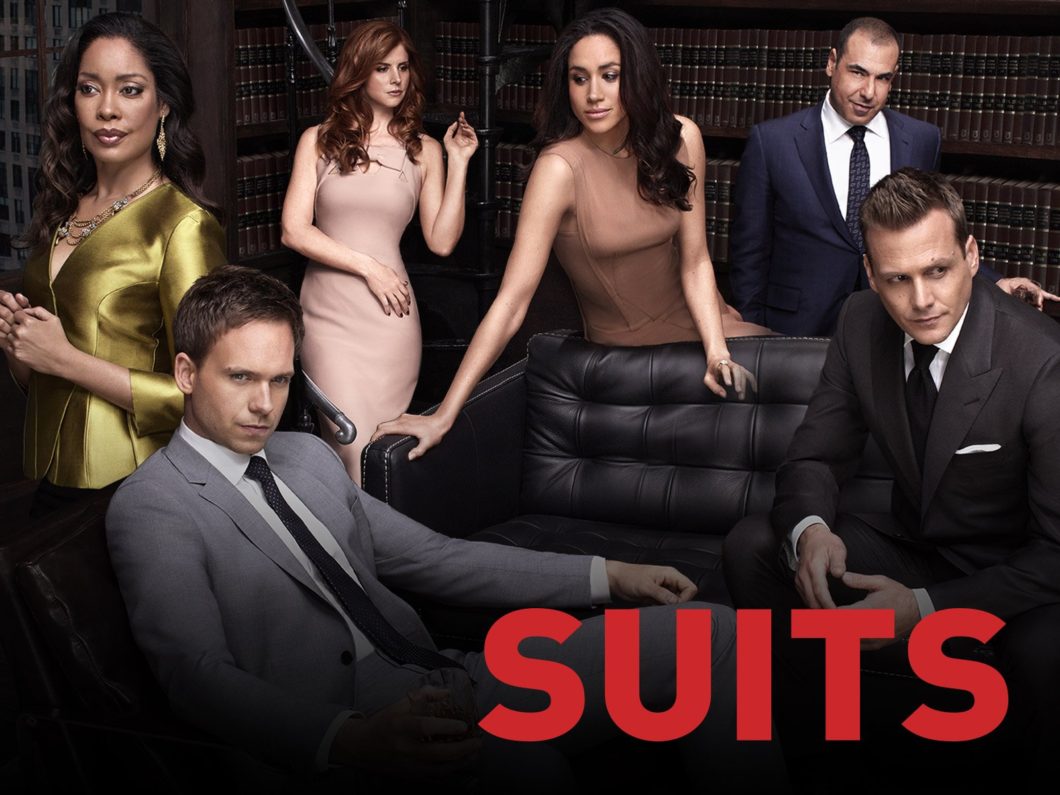I hear you! You’re saying, “Meronyms? What on Earth are meronyms?”
Well, to be honest with you, I had no idea what they were until very recently when I came across the term in a book I was reading.
Then I said the same thing:
“Meronyms? What on Earth are meronyms?”
Then I looked into them and realised that we actually use meronyms all the time.
To put it simply, a meronym is a word for anything that’s part of something else.
So “string” is a meronym of “guitar,” “button” is a meronym of “phone,” and “Ringo” is a meronym of “The Beatles.”
And despite John Lennon’s popularity, Ringo also happens to be the best Beatle.
Agreed? Good.
Because language is fun and dynamic and creative, there are lots of meronyms that we use as a kind of short cut to describe the whole thing that they belong to.
It’s as if we used “Ringo” to mean “The Beatles” — which we sadly do not do.
Let’s check out some common examples and how to use them.
1. Minds = People
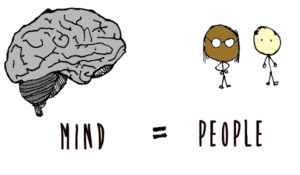
As you’ll soon discover, there are a lot of meronyms that describe people.
I guess this makes sense. We’re people. We like people and the things that people do. We’re interested in people.
And people do all sorts of things with different parts of their bodies.
When a country or a company or some sort of large institution has a problem to solve, it needs to turn to its smart people, right?
The brainy, intelligent people who can put their minds to the task and get it sorted out.
When they’re doing that, we can refer to those people as “minds.”
We often use it with the word “finest.”
“Don’t worry — we’ve got the country’s finest minds working on it as we speak.”
2. Eyes = People
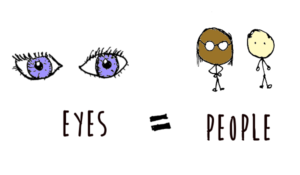
But it’s not just our brains that make us useful (though they really help, especially when it comes to making breakfast and not falling out of windows).
If we need some people to look at something, perhaps to check for mistakes or to make sure it’s working properly, then you can refer to those people as “eyes,” as that is chiefly what they’re using.
It often appears in the phrase “get some eyes on something.”
“OK, we should get some eyes on this before we release it to the public.”
3. Hands = People
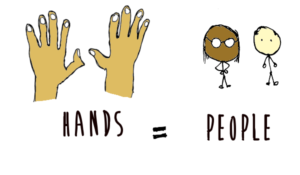
Yep! Hands are pretty useful, too.
I’m very fond of mine, which I’m using right now to type this and then afterwards to eat lasagna.
Without hands, you’d be looking at a blank page, and I’d be hungry for the rest of the day.
And without hands, you wouldn’t be able to run that chocolate giraffe shop that you’re so proud of.
In fact, in busy periods, you actually need to hire some extra people to help out.
That’s when you get some more pairs of hands.
But, to be clear, those hands do come with the rest of the human.
We usually use this meronym with “pairs of.”
“It would be good to have some extra pairs of hands over the summer period.”
4. Faces = People
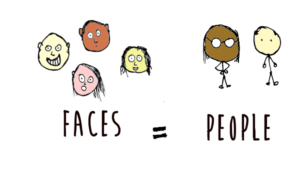
I guess the nicest thing about people is their faces.
It’s what we look at when we want to recognise someone, it’s where we look when we want to understand them and it’s what we think of when we remember them.
It’s also what we use when we want to talk about attendance — how many people came to an event:
“There were about 50 faces at the party last night — a lot of them were quite familiar.”
5. Boots = People
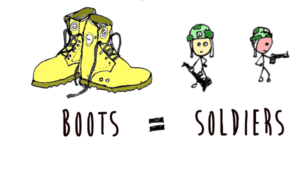
Actually, this is part of the bigger phrase “boots on the ground.”
But these boots come with people. Specifically soldiers.
The phrase “boots on the ground” refers to soldiers who are active in a military operation.
“The President doesn’t want any boots on the ground at the moment — at least not until after the election.”
6. Suit = Businessman
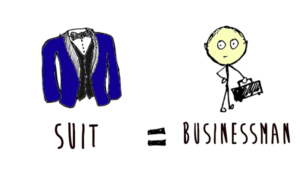
There he is! The businessman!
With his watch and shoes and ears and … well, with his suit.
We use “suit” to refer to a businessman. It’s usually a little negative, like “cop.”
“It’s so weird. He used to be really into the hippy stuff before he moved to New York and became a suit.”
In fact, there was a popular Netflix show about high-flying lawyers called Suits.
I didn’t see it. I was probably busy watching The Wire at the time.
Damn, that was a good show.
7. Wheels = Car
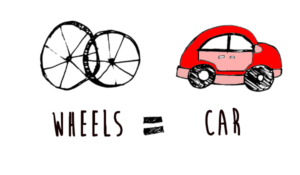
I’d be willing to bet that without wheels, your car won’t be much use unless all you need is a dry place to shelter from the rain for a bit.
So it’s no surprise that you can say “wheels” to refer to your car.
We often use it with “set of,” and it’s usually used with some sort of positive adjective:
“Woah! Nice set of wheels, mate! Is it new?”
8. Jars / Bottles / Glasses / Cans / Tins = Drinks
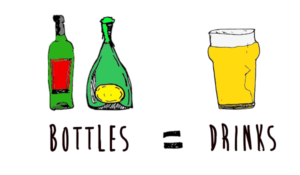
When someone asks you if you want to have a few bottles with her, she’s not inviting you to sit down with her and eat glass. That would be pretty unpleasant and probably painful.
No — she’s actually asking you if you want to have a drink (usually alcoholic) with her.
Most of these make sense as they’re referring to the container that the drink comes in.
But “jars” is a bit of an odd one, isn’t it? I mean — unless you’re at a really hipsterish place (in which case, brace yourself for the unreasonable bill), then you’re probably not drinking out of a jar.
These meronyms are often used with “a few.”
“Fancy coming down to the Three Swans for a few jars?”
(If you ever find yourself in the small Somerset town of Frome, I can strongly recommend The Three Swans. Great pub!)
9. Threads = Clothes
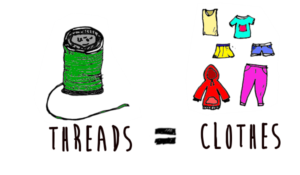
So a thread is the very thin string that keeps your clothes together.
But we can also use it to describe clothes, especially nice, new, possibly expensive, classy clothes.
“Hey hey hey! Check out the threads on this guy! Why can’t I find stuff that looks this good?”
10. Blade = Knife
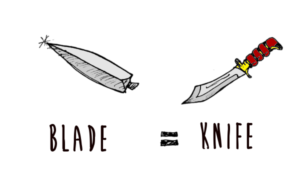
A knife is made up of two things. The handle, which you hold, and the blade, the sharp metal part that you use to cut stuff with, like a juicy, red apple.
When we use the word “blade” to mean “knife,” we’re usually referring to the kind of knife used to attack people, not fruit.
We also have the phrase “to pack a blade,” meaning “to carry a knife.”
“I’m not sure I trust him. He seems like the sort of guy who packs a blade — know what I mean?”
11. Dish = Meal
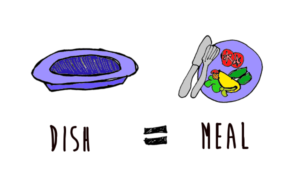
OK — we all knew this one already, right?
And that’s great! It means that you were already using meronyms before you started reading this article.
So, well done!
“You should impress her with some sort of massive, extravagant dish!”
12. B & B = Hotel
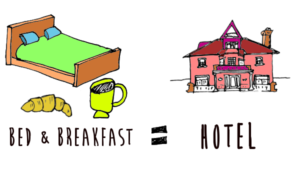
I’m not sure about wherever you’re reading this from, but in the UK, bed and breakfasts (or just “B&Bs”) are very common, especially in seaside towns.
What are they?
Well, they’re basically just cheap hotels that offer you a room for the night and breakfast the following morning.
The street I lived on as a kid actually had about seven B&Bs on it. I lived in a popular seaside resort.
And there we have it, the world of meronyms.
So next time you’re having a few tins in your B&B and thinking about what dish to cook when you get home and whether the B&B owner packs a blade, you can remember this brief time we spent together.
Did you enjoy reading this post?
If so, I might also like the following articles.
- 10 Contronyms
- 11 Retronyms
- 12 Heteronyms
- 13 Eponyms
- 15 Heterographs
- 16 Capitonyms
- 36 Acronyms
- Exonyms & Endonyms
Gabriel Clark, LOS Consultant & Clark and Miller Co-founder
